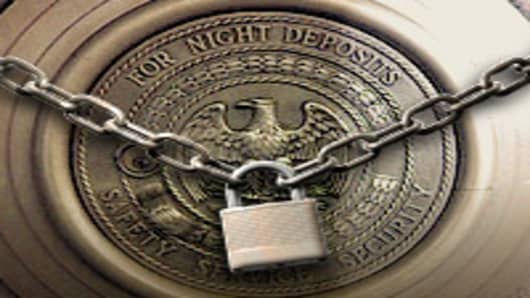European shares were called to open lower on Friday after Moody’s Investors Service cut the credit ratings of 15 of the world largest banks on Thursday, citing volatile market conditions and their continued exposure to the euro zone sovereign debt crisis.
The FTSE was called to open 47 points lower at 5519, the DAX was seen opening lower by 53 points at 6290 and the CAC 40 was expected to open lower by 24 points at 3090.
Credit Suisse, which last week was warned about weak capital levels by Switzerland's central bank, was the only bank in the group of 15 not to suffer a three-notch downgrade.
UBS was also expected to suffer a three notch downgrade but only saw its credit rating cut by two spots.
Other banks downgraded by two notches were: Barclays,BNPParibas, Royal BankofCanada, Citigroup, Goldman Sachs, JPMorgan Chase, Credit Agricole, and Deutsche Bank.
HSBC, Bank of America, Royal Bank of Scotland and Societe Generale had their credit ratings downgraded by one notch.
Morgan Stanley had its long-term debt rating lowered by just two notches, one level less than had been expected, sending its stock up sharply in after-hours trading on Wall Street.
Nomura and Macquarie were included in an original list of global banks under review, but have already been downgraded.
The leaders of Germany, France, Italy and Spain will meet in Rome on Friday in a bid to restore confidence in the euro zone ahead of a full EU summit next week.
German chancellor Angela Merkel is likely to find herself outnumbered.at the meeting as the four look for a practical way to achieve banking and fiscal union. She is expected to resist any pressure from Italian prime minister Mario Monti, French president Francois Hollande and Spanish prime minister Mariano Rajoy for less stringent euro zone fiscal policies or the issuance of common euro zone bonds.
There was some better news for Spain’s banksas independent auditors said they may only need up to 62 billion euros ($77 billion)) extra capital rather than the 100 billion euros initially feared. Spain’s medium term borrowing costs had earlier spiked to a euro era high on Thursday morning.
The announcement came as euro zone finance ministers met in Luxembourg to discuss how to channel financial aid to Spanish lenders, which are suffering as a result of the collapse of the domestic property market.
Madrid's economy minister said a formal request would be made within days for the bailout, which was agreed two weeks ago.
The International Monetary Fund (IMF) called late Thursday for European leaders to channel aid directly to struggling banks rather than via governments and for the European Central Bank (ECB) to cut interest rates, saying the future of the euro was at stake.
The ECB is on the verge of relaxing its collateral rules for central-bank loans, in a bid to ease strains on commercial banks in Spain and the rest of Southern Europe, the Wall Street Journal reported, citing people familiar with the matter.
Asian shares fell on Friday while the dollar hovered near its highest in a week-and-a-half as US manufacturing data showed manufacturing grew at its slowest pace in 11 months in June. This added to gloomy Chinese factory output figures released by HSBC on Thursday.
Invvestors will be watching closely for the latest German IFO business climate index for May released at 10:00 a.m. (CET), with analysts expecting a fall in sentiment.


